Easy way to get Google Analytics data into Nutshell CRM
Learn how you can incorporate data from Google Analytics, such as channel and landing pages, into Nutshell CRM so that you can quickly and easily determine which marketing channels and online campaigns are generating you not just leads, but also customers and subscribers.
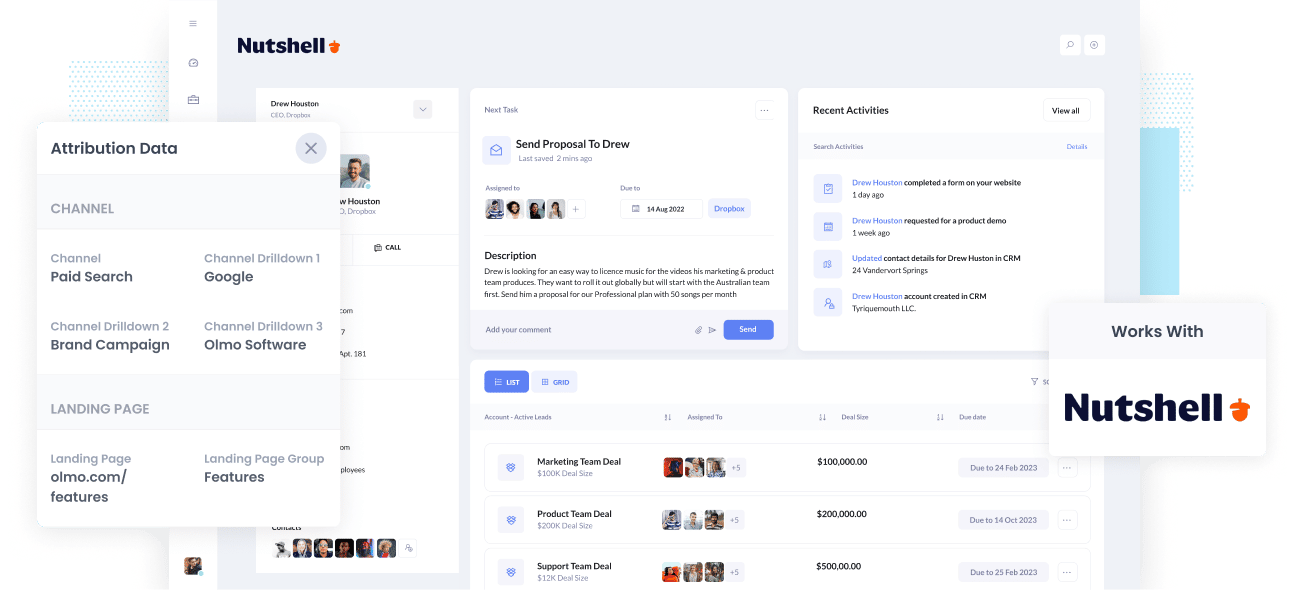
Do you know which of your marketing campaigns and channels brings the most leads and customers?
If you have this information, it can prevent you from wrongly allocating your precious marketing budget and will direct you on the right path toward growing your company.
Do not worry; we have a solution for you.
By passing Google Analytics data (including channel and landing page) to your Nutshell CRM, you will be able to generate reports that show you the exact channels and campaigns that are driving the most customers, leads and revenue.
This article will show you how to use Attributer to pass Google Analytics data into Nutshell CRM.
What is Attributer?
Attributer is a marketing attribution tool which runs in your website's HTML section. It collects technical information on your visitors' UTM parameters, devices, and referrers to determine how they got your site.
Attributer uses this collected data to categorize each visitor into groups of channels (paid social, paid search, organic search, etc.) Once organized, the information is stored in the cookie of the visitor's browser.
Also, Attributer uses this stored cookie information to populate hidden fields in your website forms every time your visitor fills one up.
And when the visitor submits the form, information such as the UTM parameters, other marketing attribution data, and the lead's name, email, phone number, etc., are sent to your Nutshell CRM.
4 steps for integrating Google Analytics data into Nutshell CRM
Using Attributer to capture UTM parameters in Nutshell CRM is easy. Here's how to do it in 4 easy steps:
1. Add hidden fields to your forms
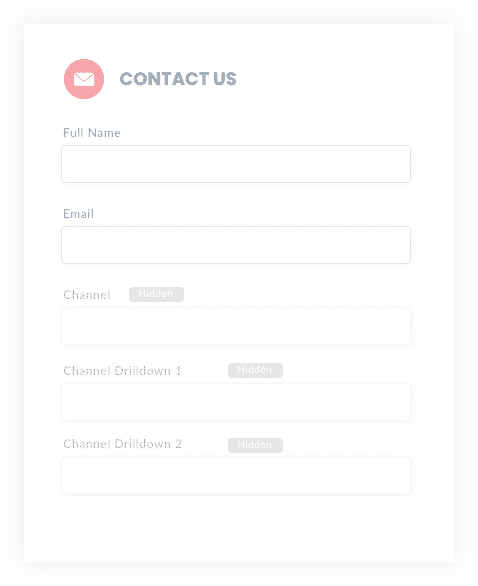
The first step for integrating data from Google Analytics into Nutshell CRM is adding hidden fields to your lead forms. In case you're unfamiliar with them, hidden fields are basically just form fields that exist on your lead capture forms, but aren't visible to the end-users.
The hidden fields you want to add are:
- Channel
- Channel Drilldown 1
- Channel Drilldown 2
- Channel Drilldown 3
- Landing Page Group
- Landing Page
If you're using a form-building tool (like Gravity Forms, Typeform, Jotform, etc), it should be as easy as dragging in a 'hidden field' to your form, or perhaps setting an existing field to be hidden. If you're working with custom HTML forms, you can use input type="hidden" to define a hidden input field.
2. Attributer automatically completes the hidden fields with Google Analytics data
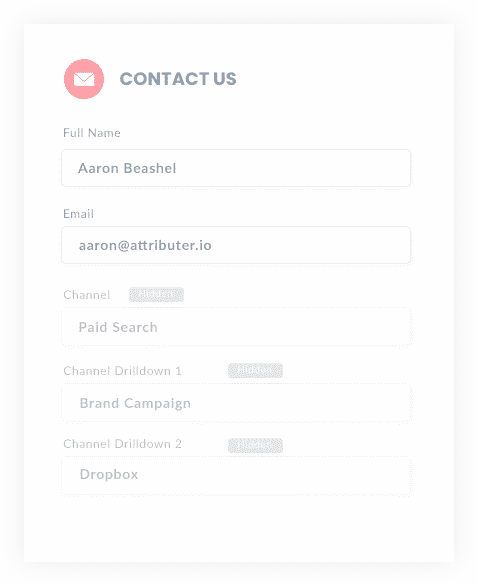
Attributer monitors where your site visitors are coming from, and every time they fill out a form, Attributer completes the hidden fields with Google Analytics data.
As an example, imagine you are a marketing associate for Dropbox and a visitor came to your website from your brand campaign in paid search. Attributer would then populate the hidden fields like this:
- Channel = Paid Search
- Channel Drilldown 1 = Google
- Channel Drilldown 2 = Brand Campaign
- Channel Drilldown 3 = Dropbox
Apart from the channel data, Attributer would also record the first landing page the visitor sees (i.e., dropbox.com/features/cloud-storage) and its group (i.e., features).
3. Google Analytics data is passed into Nutshell CRM
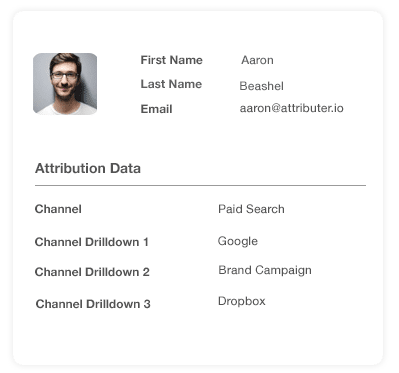
The most exciting part is that anytime the visitor decides to submit the form on your website, all of the information about the channel and landing page, and the lead’s name, phone, email, etc., will be passed to your CRM.
4. Run reports to know what channels are driving leads, customers and revenue
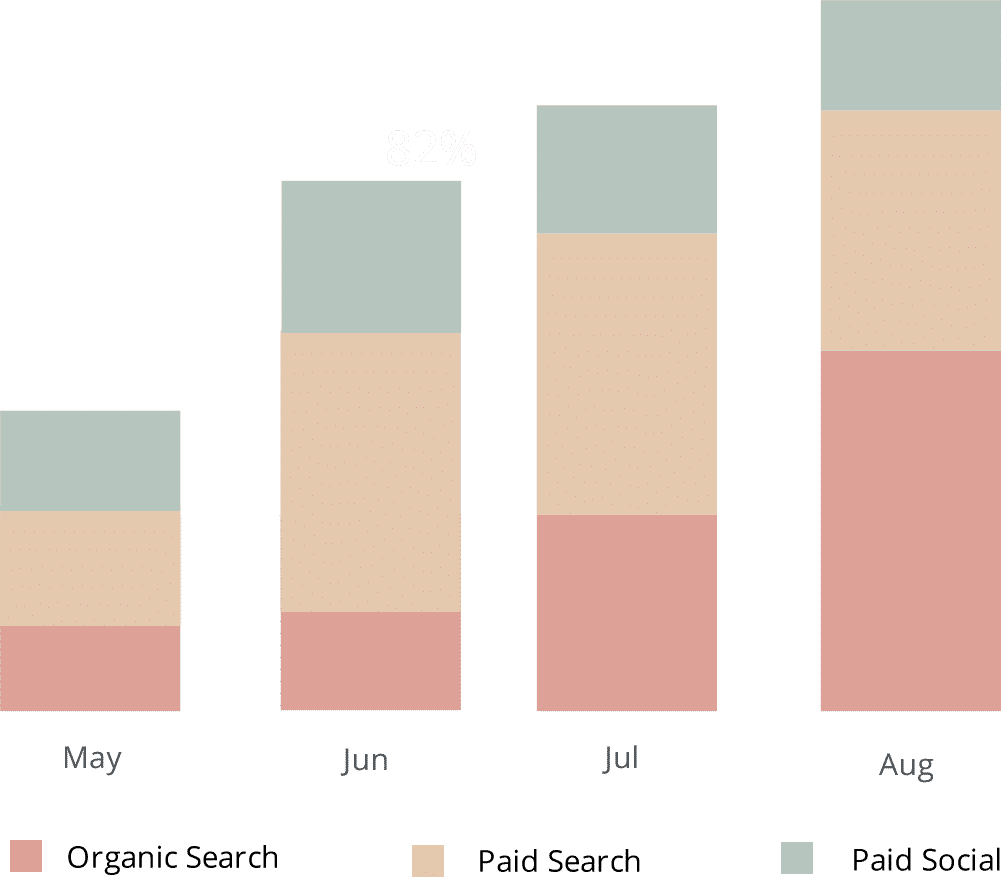
It is now possible to create reports on which channel or page is performing well since the data is already inside your CRM.
With the reports, knowing the exact numbers on leads, closed-won deals, etc., each channel and landing page is easy and accessible.
What data gets captured in Nutshell CRM?
With years of experience in marketing attribution, we believe that having the information on these two crucial elements is key to attribution:
- Channel - How did visitors reach your site? Typically it must be from one of organic search, paid search, paid social, referral, etc.
- Landing page - What content made them to come to your website? It could be your features pages, ebooks, blog, etc.
We built Attributer to enable us provide answers to these questions.
1. Marketing channel data
Attributer automatically records the information on what channels your leads come from (i.e., paid social, organic search, paid search) and additional detail on each channel (i.e., for paid search, it also records the ad group, campaign, keyword, etc.)
2. Landing page data
Attributer also collects on the first page your visitors see on your site (i.e., dropbox.com/blog/best-file-storage-tools) as well as the page’s category (i.e., blog).
This information helps view related content as a whole. Such as knowing how many leads your whole blog section has generated and looking at each blog post’s generated leads and customers.
What you can do with Google Analytics data Nutshell CRM
When the Google Analytics data is inside Nutshell, it can prove helpful in many ways:
1. Report on channels
With Google Analytics data transferred to Nutshell CRM, you run reports that will provide answers to the following questions:
- How many leads have you received from your Facebook Ads?
- What's the conversion rate of the leads from your Facebook Ads?
- How many opportunities came from your Facebook Ads?
- How much Pipeline did your Facebook Ads generate?
- How many Closed-Won deals did your Facebook Ads generate?
- How much revenue has been closed from customers from your Facebook Ads?
- What's the overall ROI of your Facebook Ads?
It is possible to create reports in Nutshell's native report builder. You can then add these reports to a Nutshell dashboard for more detailed viewing. Or you can decide to go for any analytics and business intelligence tools available in the market that can be integrated with Nutshell to run more advanced reports.
2. Tailor sales follow ups
With information on the specific channel that a lead has come from, the pages they landed on, and which ad they clicked, you can create more effective and targeted follow-up messages.
For example, if you are a sales rep for Dropbox and you noticed that a visitor arrived at your page by searching about how to share large files on Google. With this information, you have a clear idea of what that individual wants from your product and can customize your follow-up messages accordingly.
In your follow-ups, you can focus on how Dropbox is the best to share large files. For a better approach, it is advised that you also provide case studies on customers who use Dropbox for sharing large files.
With the tailored follow-up messages, your Lead to Customer conversion rate will inevitably improve as you can target and provide a solution to the lead’s needs.
3. Report on content
In addition, since Attributer gets hold of each lead’s landing page data and its respective group, you can also create reports on your website’s content performance.
You could build reports that provide insights on the following:
- How many leads did my blog get?
- Which blog posts have attracted the most leads?
- Which blog posts have the highest conversion rate?
- What’s the ROI of my blog section?
Through these reports, you can also catch instances like your blog having low opportunities and customer conversion rates despite getting a lot of traffic. With this information, you can decide whether to continue with your blog or allocate your time and resources to other things.
Wrap up
Passing Google Analytics data to Nutshell CRM can be very helpful in determining your marketing efforts’ performance. This is possible with Attributer.
Attributer is simple to install, and once it is running, you can run detailed reports and dashboards right inside Nutshell CRM. These reports will determine your SEO efforts, advertising, campaign, and content performance.
Get started for free today, and see if it fits your needs.
Get Started For Free
Start your 14-day free trial of Attributer today!

About the Author
Aaron Beashel is the founder of Attributer and has over 15 years of experience in marketing & analytics. He is a recognized expert in the subject and has written articles for leading websites such as Hubspot, Zapier, Search Engine Journal, Buffer, Unbounce & more. Learn more about Aaron here.
